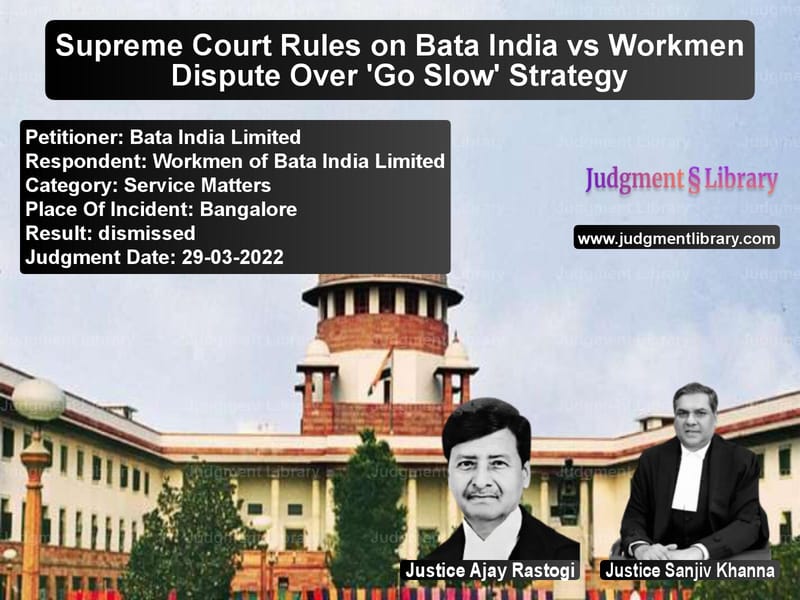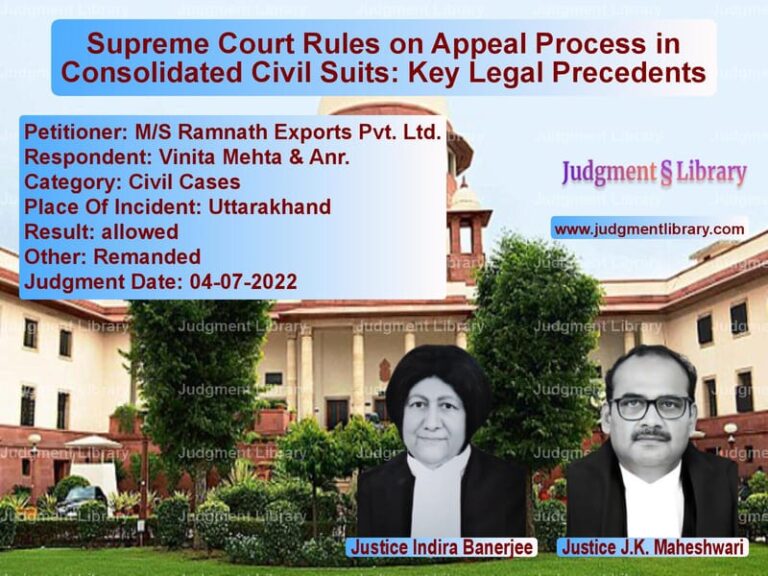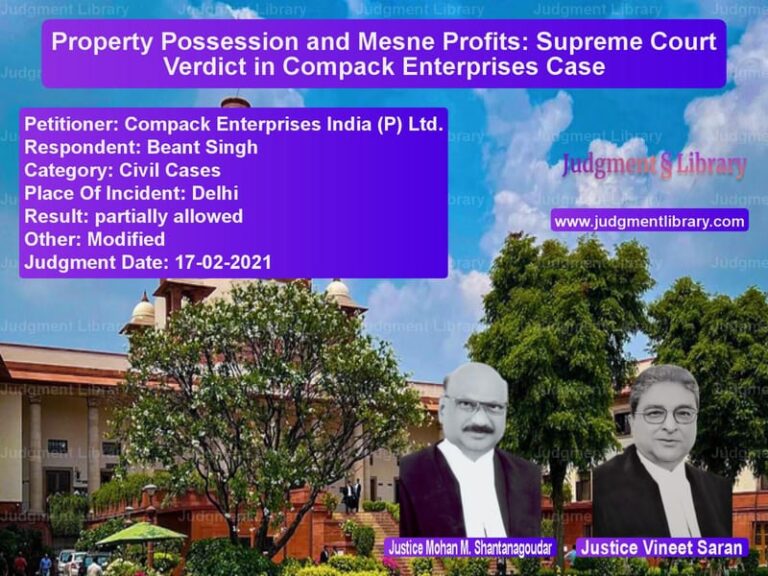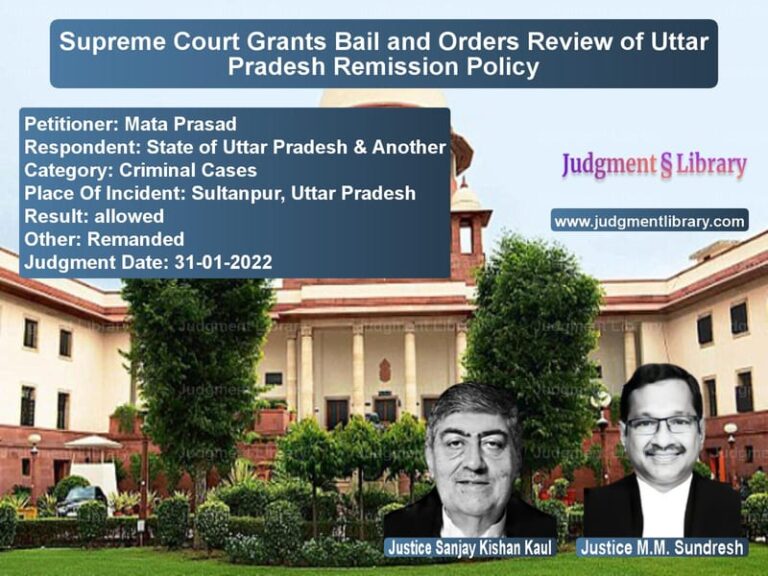Supreme Court Rules on Bata India vs Workmen Dispute Over ‘Go Slow’ Strategy
The Supreme Court of India, in its judgment dated March 29, 2022, ruled on the case of Bata India Limited vs Workmen of Bata India Limited. The case revolved around the dispute regarding the alleged “go slow” strategy adopted by the workmen and the corresponding pro-rata deduction of wages by the management.
Background of the Case
The dispute arose when Bata India Limited alleged that the workmen deliberately slowed down production, violating previous settlements between the management and employees. The workers’ union, on the other hand, contended that there was no deliberate slowdown and challenged the management’s decision to deduct wages on a pro-rata basis.
The case was first taken up by the Industrial Tribunal, then moved to the High Court of Karnataka, which ruled in favor of the workmen while granting the management the right to take appropriate steps against any future “go slow” strategy.
Petitioner’s Arguments (Bata India Limited)
The company contended:
- The workmen had agreed to produce a minimum of 1,200 pairs of shoes per shift as per settlements dated March 11, 1998, and December 14, 1998.
- Despite this agreement, the workmen deliberately slowed down production, reducing output to below 50% of the agreed target.
- The company attempted to resolve the issue through warnings and requests, but the workers continued with the slowdown.
- As a response, the management implemented pro-rata wage deductions for those failing to meet production targets.
- The workmen then refused payment and resorted to a stay-in strike, which led to the company declaring a lockout on March 8, 2000.
- After the lockout was lifted on July 3, 2000, production issues continued, and the government had to intervene to prohibit the strike and direct work resumption.
Respondent’s Arguments (Workmen of Bata India Limited)
The workmen’s union countered:
- There was no deliberate slowdown, and production targets were affected due to various operational factors.
- The management unilaterally deducted wages without proper consultation or an inquiry.
- They were not given an opportunity to present their case before the deductions were made.
- The Karnataka High Court had correctly ruled that while “go slow” tactics amount to a refusal to work, the management should have followed principles of natural justice before imposing deductions.
Supreme Court’s Observations
The Supreme Court, comprising Justices Ajay Rastogi and Sanjiv Khanna, ruled:
“The contention of the appellant that the finding in the impugned judgment pertaining to ‘go slow’ strategy being nothing short of misconduct should be set aside does not impress us.”
The Court further stated:
“A fair opportunity shall be granted to the Union or workmen, especially when there was a dispute whether or not there was production on the agreed terms.”
On Wage Deductions
The Court noted that while “go slow” tactics may justify wage deductions, the company should have followed a due process:
“What was required and necessary was giving proper opportunity to the affected person before making any deduction on a pro-rata basis.”
On Legal Precedents
The Court referenced multiple rulings regarding employment rights, fair labor practices, and wage deductions.
Final Verdict
The Supreme Court ruled:
“In view of the aforesaid findings, we vacate the stay with the direction that the appellant would make payment of the reduced/deducted wages within one month. This means that full wages would be paid.”
However, the Court clarified:
“Liberty is reserved for the appellant to take appropriate steps regarding the ‘go slow’ strategy for the period in question.”
Implications of the Judgment
This ruling has significant legal consequences:
- Employers cannot unilaterally deduct wages without giving employees an opportunity to explain their position.
- Workmen cannot resort to a “go slow” strategy without facing potential disciplinary actions.
- The Court recognizes the right of management to take appropriate steps to ensure productivity but emphasizes procedural fairness.
Conclusion
The Supreme Court’s ruling in Bata India Limited vs Workmen of Bata India Limited reinforces the principles of natural justice and fair labor practices. It strikes a balance between protecting workers’ rights and allowing management to maintain operational efficiency. This judgment ensures that any disputes related to wage deductions must be addressed through due process, fostering a more equitable work environment.
Petitioner Name: Bata India Limited.Respondent Name: Workmen of Bata India Limited.Judgment By: Justice Ajay Rastogi, Justice Sanjiv Khanna.Place Of Incident: Bangalore.Judgment Date: 29-03-2022.
Don’t miss out on the full details! Download the complete judgment in PDF format below and gain valuable insights instantly!
Download Judgment: bata-india-limited-vs-workmen-of-bata-indi-supreme-court-of-india-judgment-dated-29-03-2022.pdf
Directly Download Judgment: Directly download this Judgment
See all petitions in Employment Disputes
See all petitions in Disciplinary Proceedings
See all petitions in Public Sector Employees
See all petitions in Judgment by Ajay Rastogi
See all petitions in Judgment by Sanjiv Khanna
See all petitions in dismissed
See all petitions in supreme court of India judgments March 2022
See all petitions in 2022 judgments
See all posts in Service Matters Category
See all allowed petitions in Service Matters Category
See all Dismissed petitions in Service Matters Category
See all partially allowed petitions in Service Matters Category







